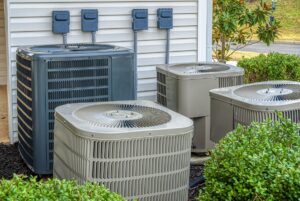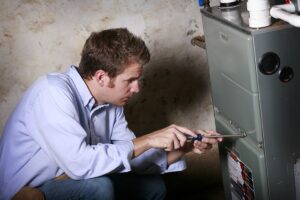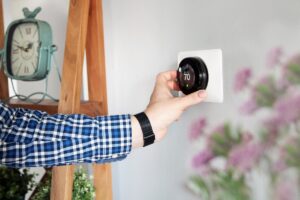When it comes to air conditioners and heat pumps, there are many factors to consider. The most important factor is the climate in which you live. If you live in a temperate climate, either an air conditioner or a heat pump will work well for you. However, if you live in a climate that is very hot or very cold, you will need to choose a system that is designed for that particular climate.

Another important factor to consider is the size of your home. If you have a small home, you may not need as much cooling or heating capacity as someone who has a larger home. This means that you can save money by choosing a smaller unit.
The experts at Robert B. Payne have over 50 years of experience in the HVAC industry and can help you choose the right system for your home. We offer a free consultation so that we can learn about your specific needs and recommend the best option for you. Contact us today to schedule your consultation!
What Are The Similarities Between Heat Pumps And Air Conditioners?
To cool your home, you can depend on a central air conditioner or a heat pump. While these systems have similarities, there are also key differences that set them apart. Here’s a closer look at the things they have in common:
- Both air conditioners and heat pumps use refrigerant to cool the air inside your home.
- Both systems have an outdoor unit that contains the compressor and condenser coils.
- They both move heat from the inside of your home to the outdoors.
- Both systems have an indoor unit that contains the evaporator coils.
When in cooling mode, except for some technical differences, both systems operate in a similar way.
What Are The Differences Between Heat Pumps And Air Conditioners?
Now that you know how these systems are similar, let’s explore the ways they differ:
The most notable difference is that heat pumps can also provide heating. An air conditioner can only cool your home. Because a heat pump has a reversing valve in its outdoor unit, it can absorb heat from outdoors and transfer it indoors to heat the air. This means that in the winter, it can keep you warm. While a heat pump is a complete heating and cooling system, an air conditioner requires a furnace to provide the same comprehensive service.
When the temperature outdoors falls below freezing, the efficiency of a heat pump drops because it then needs more energy to remove heat from the cold air in your home. To overcome this issue, an auxiliary electric heater is added to the indoor unit. But electric auxiliary heating is not highly energy efficient. That is why a furnace is often added to create a system that depends on the heat pump as the basic heat source but automatically switches to the furnace when it is more efficient to do so. This Hybrid Heat technology is clever and energy efficient.
Which System is Ideal For You?
While both a heat pump and an air conditioner have their pros and cons, one system may be better suited for your home than the other. Here are some factors to consider:
Purchase And Installation Cost
A heat pump has a cheaper indoor unit than an AC but the outdoor unit is more expensive.
The installation cost of a heat pump is also higher than that of an AC. While looking at cost, you should consider the overall costs to install a system that takes care of your home’s heating and cooling needs. If you would like to find out the total cost of installation for each system, contact our staff at Robert B. Payne.
Energy Efficiency / Operational Cost
Heat pumps generally provide efficient heating in milder climates using electricity. This makes them more energy efficient than systems that rely on costlier heating fuel sources such as propane, oil, and natural gas. But when temperatures move below zero, your heat pump needs more energy to function, which makes it less efficient and causes a spike in your electricity bill. You can overcome this issue by adding a furnace to the heat pump and setting up a Hybrid Heat system. Because of the greater initial cost of the heat pump, this combination system is more expensive than the often paired AC and furnace system.
Seasonal Energy Efficiency Ratio (SEER) ratings are the standard for determining the efficiency of a heat pump or air conditioner. This makes it easy to analyze different models. A higher SEER rating indicates a more efficient system. In cooling mode, heat pumps and air conditioners have available models that provide high SEER ratings. But in heating mode, the HSPF rating defines a heat pump’s efficiency. More efficient models have higher HSPF ratings. Your location is a major factor when looking at operational cost and energy efficiency. When it comes to heating, heat pumps are more energy efficient in moderate climates than in very cold climates. To get a model with high energy efficiency, choose one with Energy Star certification.
Life Span
The life span of your system is an important consideration. Although there are many factors that affect the longevity of an HVAC system, air conditioning systems last a little longer than heat pumps. This is because heat pumps work all through the year. They provide both heating and cooling, meaning they have to go through two complete seasons of wear and tear. An AC unit only has to provide cooling, so it experiences only one season of wear and tear. This gives it a longer lifespan. A heat pump may compensate for this disadvantage by providing energy-efficient heating in moderately cold weather that saves you money. An annual maintenance plan by a professional HVAC contractor like Robert B. Payne can increase the lifespan of your heat pump or AC unit. This also ensures your system works at peak energy efficiency.
For More Information, Contact The Experts
Now that you know more about how these systems differ, you can make a more informed decision about which one is right for your home. If you have any questions or would like help choosing the best system for your needs, please contact the experts at Robert B. Payne. Our team is ready to help you with all your heating and cooling needs. Give us a call today at 540-373-5876!






